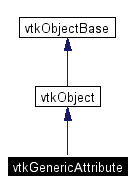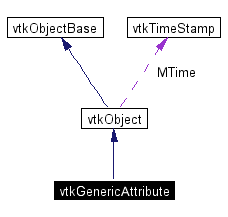vtkGenericAttribute Class Reference
#include <vtkGenericAttribute.h>
Inheritance diagram for vtkGenericAttribute:
 [legend]
[legend]Collaboration diagram for vtkGenericAttribute:
 [legend]List of all members.
[legend]List of all members.
Detailed Description
abstract class defined API for attribute data
vtkGenericAttribute is an abstract class that defines an API for attribute data. Attribute data is data associated with the topology or geometry of a dataset (i.e., points, cells, etc.). vtkGenericAttribute is part of the adaptor framework (see GenericFiltering/README.html).
vtkGenericAttribute provides a more general interface to attribute data than its counterpart vtkDataArray (which assumes a linear, contiguous array). It adopts an iterator interface, and allows attributes to be associated with points, edges, faces, or edges.
- Created by:
-
- CVS contributions (if > 5%):
-
- CVS logs (CVSweb):
/Filtering/vtkGenericAttribute.h)/Filtering/vtkGenericAttribute.cxx)
- Tests:
- vtkGenericAttribute (Tests)
Definition at line 57 of file vtkGenericAttribute.h.
Member Typedef Documentation
Constructor & Destructor Documentation
| vtkGenericAttribute::vtkGenericAttribute |
( |
|
) |
[protected] |
|
Member Function Documentation
| virtual const char* vtkGenericAttribute::GetClassName |
( |
|
) |
[virtual] |
|
| int vtkGenericAttribute::IsTypeOf |
( |
const char * |
type |
) |
[static] |
|
|
|
Return 1 if this class type is the same type of (or a subclass of) the named class. Returns 0 otherwise. This method works in combination with vtkTypeRevisionMacro found in vtkSetGet.h.
Reimplemented from vtkObject. |
| virtual int vtkGenericAttribute::IsA |
( |
const char * |
type |
) |
[virtual] |
|
|
|
Return 1 if this class is the same type of (or a subclass of) the named class. Returns 0 otherwise. This method works in combination with vtkTypeRevisionMacro found in vtkSetGet.h.
Reimplemented from vtkObject. |
| virtual void vtkGenericAttribute::PrintSelf |
( |
ostream & |
os, |
|
|
vtkIndent |
indent |
|
) |
[virtual] |
|
|
|
Methods invoked by print to print information about the object including superclasses. Typically not called by the user (use Print() instead) but used in the hierarchical print process to combine the output of several classes.
Reimplemented from vtkObject. |
| virtual const char* vtkGenericAttribute::GetName |
( |
|
) |
[pure virtual] |
|
|
|
Name of the attribute. (e.g. "velocity") - Postcondition:
- result_may_not_exist: result!=0 || result==0
|
| virtual int vtkGenericAttribute::GetNumberOfComponents |
( |
|
) |
[pure virtual] |
|
|
|
Dimension of the attribute. (1 for scalar, 3 for velocity) - Postcondition:
- positive_result: result>=0
|
| virtual int vtkGenericAttribute::GetCentering |
( |
|
) |
[pure virtual] |
|
|
|
Is the attribute centered either on points, cells or boundaries? - Postcondition:
- valid_result: (result==vtkPointCentered) || (result==vtkCellCentered) || (result==vtkBoundaryCentered)
|
| virtual int vtkGenericAttribute::GetType |
( |
|
) |
[pure virtual] |
|
|
|
Type of the attribute: int, float, double - Postcondition:
- valid_result: (result==VTK_INT)||(result==VTK_FLOAT)
|
| virtual vtkIdType vtkGenericAttribute::GetSize |
( |
|
) |
[pure virtual] |
|
|
|
Number of tuples. - Postcondition:
- valid_result: result>=0
|
| virtual unsigned long vtkGenericAttribute::GetActualMemorySize |
( |
|
) |
[pure virtual] |
|
|
|
Size in kilobytes taken by the attribute. |
| virtual double* vtkGenericAttribute::GetRange |
( |
int |
component = 0 |
) |
[pure virtual] |
|
|
|
Range of the attribute component `component'. If `component'==-1, it returns the range of the magnitude (euclidean norm). It returns double, even if GetType()==VTK_INT. NOT THREAD SAFE - Precondition:
- valid_component: (component>=-1)&&(component<GetNumberOfComponents())
- Postcondition:
- result_exists: result!=0
|
| virtual void vtkGenericAttribute::GetRange |
( |
int |
component, |
|
|
double |
range[2] |
|
) |
[pure virtual] |
|
|
|
Range of the attribute component `component'. If `component'==-1, it returns the range of the magnitude (euclidean norm). THREAD SAFE - Precondition:
- valid_component: (component>=-1)&&(component<GetNumberOfComponents())
|
| virtual double vtkGenericAttribute::GetMaxNorm |
( |
|
) |
[pure virtual] |
|
|
|
Return the maximum euclidean norm for the tuples. - Postcondition:
- positive_result: result>=0
|
|
|
Attribute at all points of cell `c'. - Precondition:
- c_exists: c!=0
c_valid: !c->IsAtEnd()
- Postcondition:
- result_exists: result!=0
valid_result: sizeof(result)==GetNumberOfComponents()*c->GetCell()->GetNumberOfPoin ts()
|
|
|
Put attribute at all points of cell `c' in `tuple'. - Precondition:
- c_exists: c!=0
c_valid: !c->IsAtEnd()
tuple_exists: tuple!=0
valid_tuple: sizeof(tuple)>=GetNumberOfComponents()*c->GetCell()->GetNumberOfPoint s()
|
|
|
Value of the attribute at position `p'. - Precondition:
- p_exists: p!=0
p_valid: !p->IsAtEnd()
- Postcondition:
- result_exists: result!=0
valid_result_size: sizeof(result)==GetNumberOfComponents()
|
|
|
Put the value of the attribute at position `p' into `tuple'. - Precondition:
- p_exists: p!=0
p_valid: !p->IsAtEnd()
tuple_exists: tuple!=0
valid_tuple_size: sizeof(tuple)>=GetNumberOfComponents()
|
| virtual void vtkGenericAttribute::GetComponent |
( |
int |
i, |
|
|
vtkGenericCellIterator * |
c, |
|
|
double * |
values |
|
) |
[pure virtual] |
|
|
|
Put component `i' of the attribute at all points of cell `c' in `values'. - Precondition:
- valid_component: (i>=0) && (i<GetNumberOfComponents())
c_exists: c!=0
c_valid: !c->IsAtEnd()
values_exist: values!=0
valid_values: sizeof(values)>=c->GetCell()->GetNumberOfPoints()
|
|
|
Value of the component `i' of the attribute at position `p'. - Precondition:
- valid_component: (i>=0) && (i<GetNumberOfComponents())
p_exists: p!=0
p_valid: !p->IsAtEnd()
|
|
|
Recursive duplication of `other' in `this'. - Precondition:
- other_exists: other!=0
not_self: other!=this
|
|
|
Update `this' using fields of `other'. - Precondition:
- other_exists: other!=0
not_self: other!=this
|
The documentation for this class was generated from the following file:

